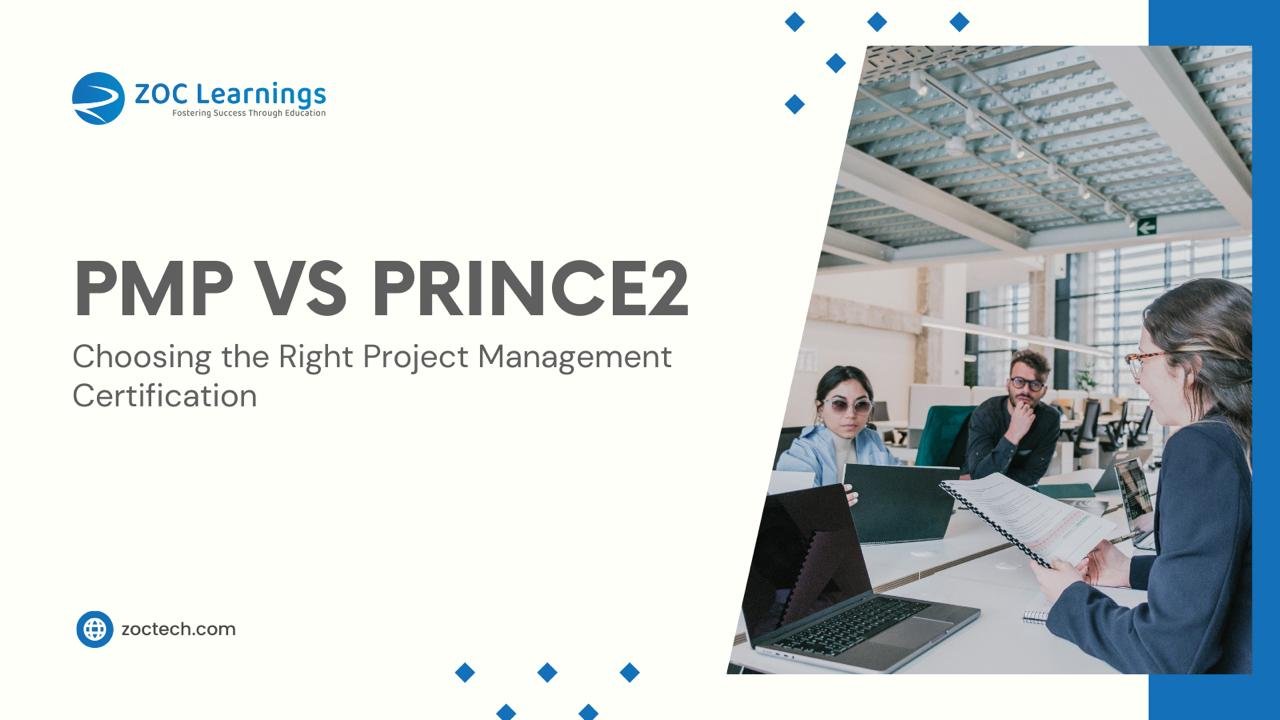Project Management Certification enhances the individual’s professional credibility and attitude of competitiveness in this business environment. It is a recognized validation that demonstrates the holder’s skills and knowledge. The certification shows the individual’s specific standards set by prestigious organizations, which can instill confidence in employers and clients. The dynamic business world is hunting for individuals that can largely contribute to the respective organizations.
Project management certifications are essential for individuals and organizations seeking to improve project success rates and professional integrity.
The two renowned and reputed project management certifications are PMP (Project Management Professional) and PRINCE2 (Projects in Controlled Environments), and they each have their own approach and goals.
Depending on your career roadmap, industry, interest, and geographic location, you can decide to opt for any of these certifications. However, decision depends upon multiple factors:
- Procedure:
- PMP is based on the PMBOK (Project Management Body of Knowledge) guide, which provides a detailed skeleton covering different aspects of project management.
- PRINCE2 is an organized project management method that bi projects into manageable stages with clear processes, roles, and responsibilities.
- Emphasis:
- PMP emphasizes the knowledge areas needed for successful project management. These include scope, integration, time, cost, quality, human resources, communication, risk, procurement, and stakeholder management.
- PRINCE2 method focuses on various elements for effective project management. The important elements are the significance of business justification, transparently defined business roles and responsibilities, structured methodology, managing project stages, and flexibility in adapting to changes.
- Industry and Geographic Relevance:
- Project Management Professional or PMP is globally recognized and its application is widely seen in different sectors or industries such as IT, construction, healthcare, banking, and telecommunications.
- PRINCE2 is particularly well-known in the United Kingdom and Europe, where it is very commonly used in government projects, but it is also gaining popularity in other areas and industries.
- Certification Criteria:
- It is important that an individual has the required experience and education to obtain the PMP certification. The education required is either a bachelor’s degree, with the work experience of around 4500 hours of project management or a high school diploma and 7500 hours of experience.
- Completion of training courses and passing examinations at the foundation and practitioner levels help in obtaining PRINCE2 certification.
- Flexible approach:
- You will find that PMP gives high importance to adaptability and flexibility in project management. The flexible approach to project management helps practitioners cater to the organization’s needs and project requirements. Adaptation to methodologies is the best business approach that PMP follows.
- Likewise, in project delivery, seeking consistency and repeatability turns out to be very beneficial for organizations. And with the help of PRINCE2, it is possible, as it offers a well-organized and standardized approach.
- Project Management of various sizes:
- PMP (Project Management Professional) is known to be ideal for managing projects of different complexities and various sizes. PMP is good for small-scale initiatives and large, complex endeavors.
- PRINCE2 (Projects in Controlled Environments) is known to manage large-scale projects, especially those that require a strong emphasis on governance and control and have well-defined stages and processes.
Whether to go for PMP or PRINCE2 is a personal choice and it mainly depends on the individual’s career goals, industry requirements, and the kind of projects a person wants to manage. To make a correct decision, it is important to list down professional goals, current skill set, and the demands of the job market in the area. Some professionals prefer to pursue both certifications to obtain an elaborated understanding of project management methodologies and increase their marketability.
- Why is it important to have a project management certificate?
Career Growth: To open up new career opportunities, individuals prefer to hold a project management certification. It also helps them to upskill and increase earning potential. Many employers prefer or require professionals with certifications for project management roles, especially in competitive industries.
International Recognition: Professionals that work abroad or hope to work abroad will find certifications such as PMP and PRINCE2 to be invaluable resources due to their global recognition. They offer a standard vocabulary and structure for project management procedures used in many nations and sectors.
Standardized Methodologies: Certifications often promote standardized project management techniques, which offer an organized way to organize, carry out, and oversee projects. This can lead to better project outcomes. This promotes efficiency and consistency in the completion of projects.
Professional Development: Getting a project management certification usually entails learning new information and abilities through independent study and official instruction. It is beneficial for professional development and remaining current with the newest trends and best practices in project management to engage in this continuous learning process.
Enhanced Credibility and Trust: Stakeholders, such as clients, team members, and senior management, view certified project managers as more trustworthy and credible. A dedication to professionalism and respect for industry standards is demonstrated by certification.
Risk management: Risk management concepts and methods are frequently covered in project management certifications, which aid in the efficient identification, evaluation, and mitigation of risks by professionals. This may result in less expensive mistakes or delays and more fruitful project outcomes.
Networking Opportunities: Membership in professional associations or communities is frequently offered as part of certification programs. This gives participants access to resources, networking opportunities, and the assistance of other project management experts. Expanding professional connections, exchanging ideas, and sharing expertise can all benefit from this.
Considering all the aspects of the business world, it is clear that project management certifications play a vital role in raising project success rates. The companies and people who are looking to strengthen their professional reputation aim to complete project management certifications. In the dynamic and fast-paced corporate world, these certifications maintain competitiveness.











